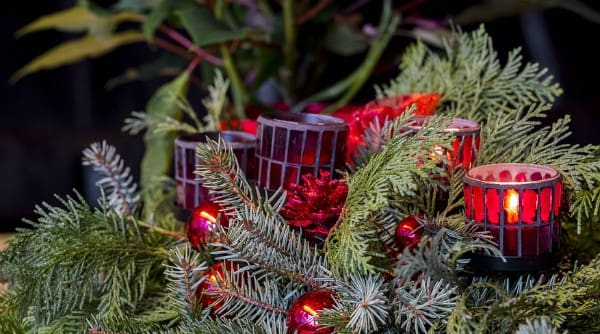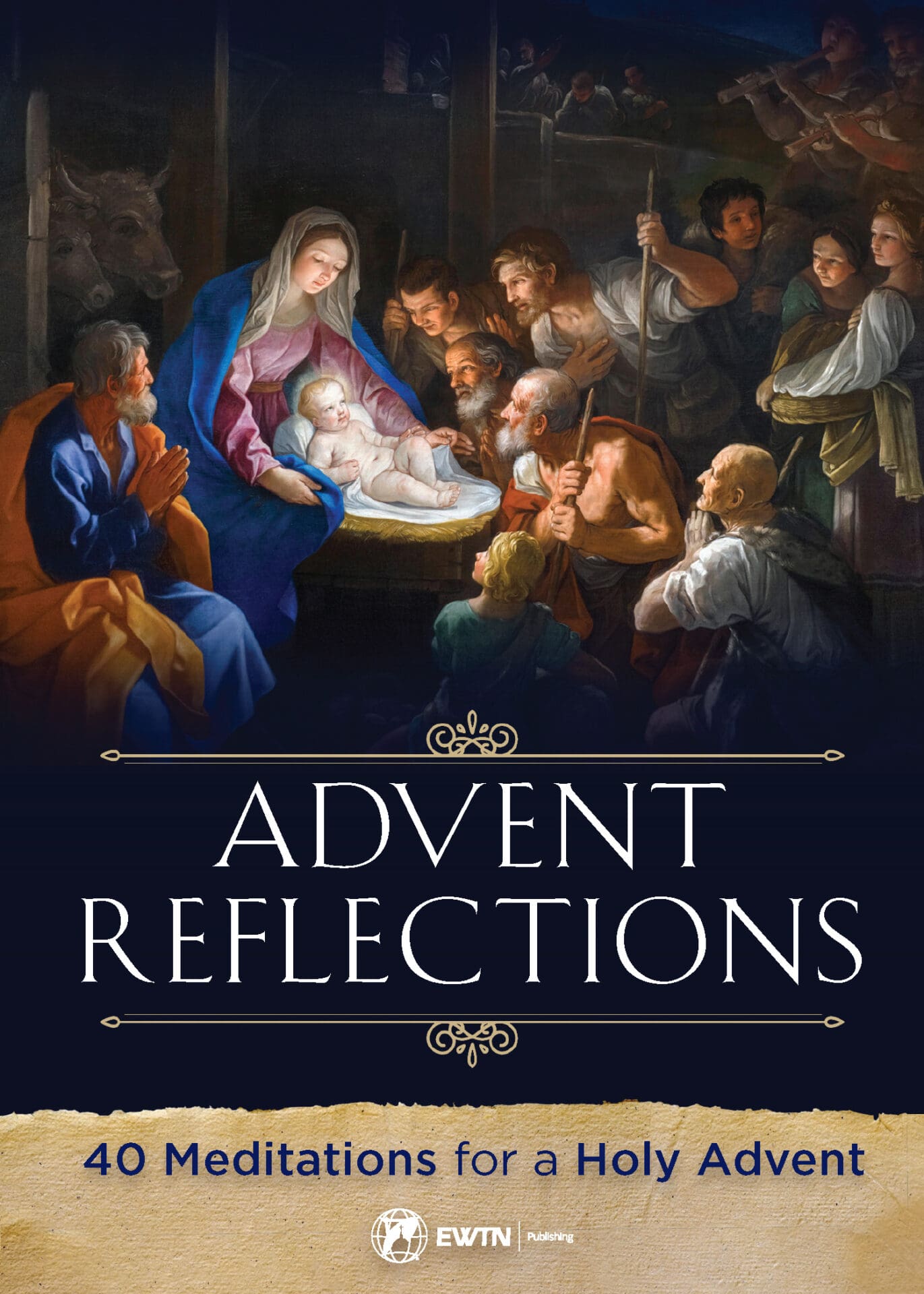Fr. Richard Biggerstaff, 2010
St. Anthony of Padua Church, Rye, England
The Church offers us two great seasons of preparation: Lent and Advent. But they are never just about preparation for a feast; rather, they are about preparing us for Heaven itself. We must not trick ourselves into thinking that all we need to do is look back; we must look forward and take stock of our progress and future in the business of holiness.
I’d like to highlight three Advent themes that have a particular resonance for me and that are part of the language of the Church in this season. The first of the Advent themes is death. But we must speak of the reality and the certainty of our inevitable death in the light of Advent hope.
Pope Benedict XVI, speaking at the beginning of Advent in 2007, said this: “Every year this basic spiritual attitude [of Advent hope] is reawakened in the hearts of Christians, who, while they prepare to celebrate the great Feast of Christ the Savior’s Birth, revive the expectation of his glorious second coming at the end of time.”3 This is a good reminder in a season when we can easily get swept along by all the traditions of preparing for the feast — but those traditions must be accompanied by the deeper preparation for the fulfillment of the mysteries that Christmas proclaims. The coming of the Lord in our history looks forward to “his glorious return, so every personal existence is called to be measured against him — in a mysterious and multiform way — during the earthly pilgrimage, in order to be found ‘in him’ at the moment of his return.”
The second theme I’d like to highlight is our way of life — that is, the necessity of really living in Christ, not just being inspired by Him. Christ is not simply the Man of Galilee, Whom we follow; rather, His life lives in us, and the flourishing of His life in us becomes the means by which we flourish. His life and grace become the means by which we can do heroic things for love. In sum, His life becomes the very definition of our lives so that we can truly be His, truly Christian.
The third theme is that of joy, the hallmark of a good companion. Joy is energizing and pure. It is true that these weeks fill many with dread — the dread of what it is to be alive. As Christmas approaches, there are so many in our communities who would prefer not to be around all these celebrations. There is the burden of depression, which is exacerbated by the darkness and the sometimes forced festiveness — that parody of joy that can become deeply unsatisfying.
In talking to the young people of Scotland in Glasgow, Pope Benedict put it like this:
My dear young Catholics . . . I urge you to lead lives worthy of our Lord (cf. Eph. 4:1) and of yourselves. There are many temptations placed before you every day . . . which the world tells you will bring you happiness, yet these things are destructive and divisive. There is only one thing which lasts: the love of Jesus Christ personally for each one of you. Search for him, know him and love him, and he will set you free from slavery to the glittering but superficial existence frequently proposed by today’s society. Put aside what is worthless and learn of your own dignity as children of God.
Now let us turn to the readings for the First Sunday of Advent, which begin with a passage from Isaiah, who foreshadows the Birth of Jesus Christ — His Birth, His life, and indeed, His Resurrection. On the First Sunday of Advent, we hear the prophet speak in the voice of God and call the people of Israel to repentance in order to prepare for the coming of His Son (2:1–5). But the Old Testament people of Israel also represent the New Testament Church, so the call to repentance applies to us as well. Christ has already come, but His coming again at the end of time necessitates that we prepare our souls. We need to walk in the light of the Lord just as surely as the Israelites of Isaiah’s time did.
At the heart of the message, we have the mysterious image of the mountain. “It shall come to pass in the latter days that the mountain of the house of the Lord shall be established as the highest of the mountains, and shall be raised above the hills; and all the nations shall flow to it.” (Isa. 2:2).
The idea of the mountain of God as the goal of all nations is a very ancient one. Isaiah, however, has a more precise image in mind: that of the mountain of the Temple of the Lord. This is the place of worship, but it is also the place where the unity of nations can be seen. It is the city of peace, Jerusalem.
Centuries later, Jesus will triumphantly enter Jerusalem to be crowned as King, and it is where the Word of God will spend His last days before His Crucifixion. Outside the city, His outstretched arms will draw all people to Him, and in the city, He will instruct His apostles to stay and to wait for the coming of the Holy Spirit, the promise of the Father. Through Jerusalem came salvation to the world. Through Jerusalem came the meaning of true love. Through Jerusalem came the fulfillment of everlasting justice and peace in the Kingdom of God. Thus, we can now truly say, “Let us walk in the light of the Lord!” (Isa. 2:5).
The Second Reading for this Sunday comes from the Letter to the Romans (13:11–14), in which we’re reminded of the urgency of this present time. Salvation is even nearer to us now. We cannot halt time, and if we attempt to do so through a disordered nostalgia or by burdening ourselves with regrets, we halt the very business of life itself.
Rather, we are to look to the coming of the Lord and live in recognition of our God-given dignity. We live with the joy this hope brings.
These verses remind us of the importance of our daily decision for God. At the beatification of St. John Henry Newman, Pope Benedict spoke of Newman’s motto, Cor ad cor loquitur, or “Heart speaks unto heart”:
[This motto] gives us an insight into his understanding of the Christian life as a call to holiness, experienced as the profound desire of the human heart to enter into intimate communion with the Heart of God. He reminds us that faithfulness to prayer gradually transforms us into the divine likeness.
The Gospel of St. Matthew this week (24:37–44) also speaks of the return of Jesus, reminding us of the necessity of decisive watchfulness. Christ paints a picture of everyday normality in His words to His apostles, but it is precisely in the “normal” times that we are most likely to forget about Him. Everything feels the same as usual — boring, even — but the truth is that life is completely out of balance.
There is no room for God, because we have filled up that space with self — our worries and concerns and desires. There is no room for worship, because our relentless search for substitutes has left us exhausted and hardened. There is no room for charity, because we have distracted ourselves with endlessly complicated questions about our own time and resources, leaving us without answers and numb to the needs of others.
Pope Benedict said in an Advent address that “man is the one creature free to say ‘yes’ or ‘no’ to eternity, that is, to God.” A human being is able to extinguish hope within him by eliminating God from his life. How can it happen that the creature made for God, intimately oriented to Him, can deprive himself of this richness? God knows, however, that those who reject Him have not recognized His true face. And so He never ceases to knock on the door of our souls like a humble pilgrim in search of hospitality. Let us use this Advent season to respond to that knock.
After all, this is the beginning of a new liturgical year. It is a gift of God, Who wished to reveal Himself to us in the mystery of Christ through the world and through the sacraments. Pope Benedict concluded those Advent vespers with this beautiful prayer to Our Lady, a fitting conclusion to this reflection:
O Mary, Virgin of expectation and Mother of hope, revive the spirit of Advent in your entire Church, so that all humanity may start out anew on the journey towards Bethlehem, from which it came, and that Sun that dawns upon us from on high will come once again to visit us.
+
This article is adapted from a chapter in Advent Reflections by Brandon McGinley, which is available from Sophia Institute Press.
Art for this post on Advent: Cover and featured image used with permission.





